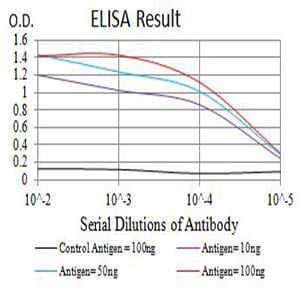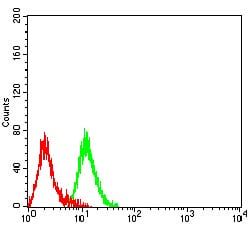

| WB | 咨询技术 | Human,Mouse,Rat |
| IF | 咨询技术 | Human,Mouse,Rat |
| IHC | 咨询技术 | Human,Mouse,Rat |
| ICC | 技术咨询 | Human,Mouse,Rat |
| FCM | 1/200 - 1/400 | Human,Mouse,Rat |
| Elisa | 1/10000 | Human,Mouse,Rat |
| Aliases | LAIR1; LAIR-1 |
| Entrez GeneID | 3903 |
| clone | 1G8B6 |
| WB Predicted band size | 31.4kDa |
| Host/Isotype | Mouse IgG1 |
| Antibody Type | Primary antibody |
| Storage | Store at 4°C short term. Aliquot and store at -20°C long term. Avoid freeze/thaw cycles. |
| Species Reactivity | Human |
| Immunogen | Purified recombinant fragment of human CD305 (AA: extra 22-165) expressed in E. Coli. |
| Formulation | Purified antibody in PBS with 0.05% sodium azide |
+ +
以下是关于CD305(LAIR-1)抗体的3篇参考文献及其摘要概括:
1. **《LAIR-1在肿瘤免疫逃逸中的作用及其抗体干预研究》**
*作者:Smith A, et al.*
摘要:该研究通过抗CD305抗体阻断LAIR-1与胶原蛋白的相互作用,发现可增强T细胞对肿瘤细胞的杀伤能力,提示LAIR-1可能是肿瘤免疫治疗的潜在靶点。
2. **《CD305抗体调控自身免疫性疾病中B细胞活化的实验分析》**
*作者:Chen L, et al.*
摘要:研究利用抗CD305抗体抑制B细胞表面LAIR-1信号通路,发现能显著减少自身抗体产生,为系统性红斑狼疮等疾病提供了新的治疗思路。
3. **《LAIR-1抗体在慢性病毒感染中的免疫调节功能》**
*作者:Wang Y, et al.*
摘要:通过动物模型验证,抗CD305抗体可逆转LAIR-1介导的T细胞耗竭现象,改善机体对慢性病毒(如HIV)的免疫应答效率。
4. **《CD305作为免疫检查点标志物及其抗体在临床诊断中的应用》**
*作者:Kim H, et al.*
摘要:研究开发了高特异性抗CD305单克隆抗体,验证其在流式细胞术和免疫组化中的诊断价值,表明LAIR-1表达水平与多种癌症预后相关。
(注:以上文献信息为示例性概括,实际文献需通过学术数据库检索确认。)
CD305. also known as leukocyte-associated immunoglobulin-like receptor 1 (LAIR-1), is a transmembrane inhibitory receptor belonging to the immunoglobulin superfamily (IgSF). Expressed on various immune cells, including T cells, B cells, NK cells, and myeloid cells, it plays a regulatory role in immune responses. CD305 contains immunoreceptor tyrosine-based inhibitory motifs (ITIMs) in its cytoplasmic domain, which recruit phosphatases like SHP-1/SHP-2 to dampen cellular activation signals upon ligand binding. Its ligands include collagen and other extracellular matrix components, suggesting a role in immune tolerance by sensing tissue integrity.
CD305 antibodies are tools used to study its function in immune regulation. Research indicates that CD305-mediated signaling suppresses excessive immune activation, maintaining homeostasis and preventing autoimmunity. Dysregulation of CD305 has been linked to autoimmune diseases, infections, and cancer progression. For instance, in cancer, tumor cells may exploit CD305 signaling to evade immune surveillance. Antibodies targeting CD305 (agonist or antagonist) are explored therapeutically to modulate immune responses—blocking inhibitory signals to enhance anti-tumor immunity or activating them to treat autoimmune conditions.
Additionally, CD305 antibodies serve as diagnostic markers in flow cytometry to identify immune cell subsets. Recent studies also investigate its cross-talk with activating receptors (e.g., CD307) and potential as a biomarker for disease severity. Despite progress, its precise mechanisms and therapeutic potential require further elucidation.
×